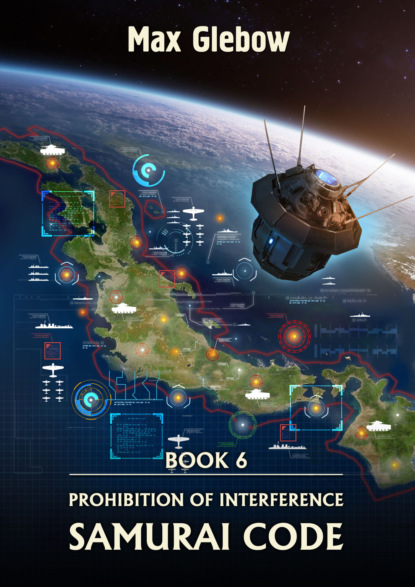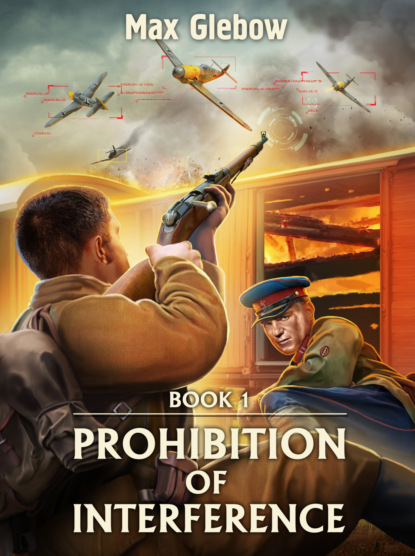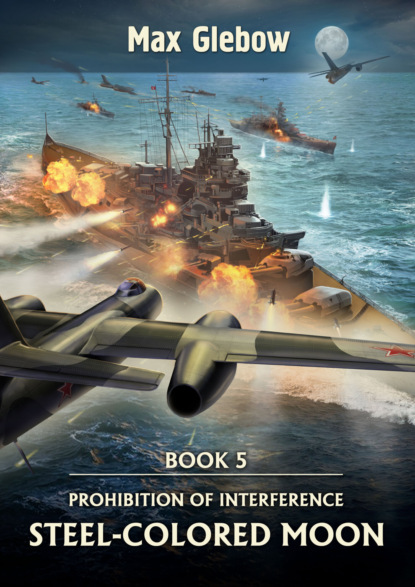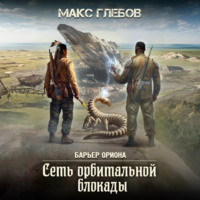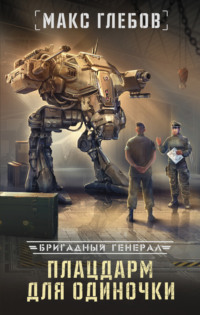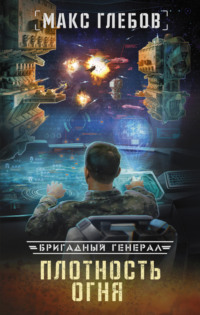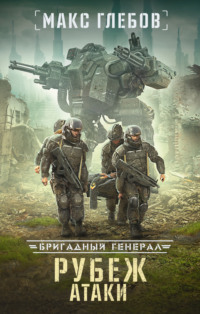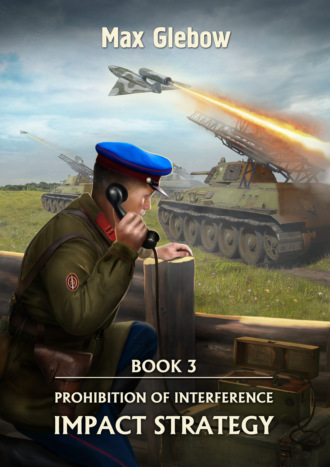
Полная версия
Prohibition of Interference. Book 3. Impact Strategy
The hum of the engines distracted the Lieutenant from his thoughts. A PS-84 transport plane, escorted by three fighters, was coming in for a landing. To the Lieutenant's surprise, the Yaks did not leave for their airfield, but began to approach after the transport plane.
“This is your cover, Lieutenant,” said the squadron commander, who approached discreetly from behind, and nodded toward the Yaks.
“And why should I be honored like that, Comrade Captain?” Kalina pulled off his flight helmet and ruffled his hair.
“It's not for you,” said the commander, with a chuckle, “you're under the command of the senior lieutenant of state security for the duration of the flight. You and I are better off not knowing the name of this comrade, but any order he gives you is a law.”
A rather young officer in a NKVD uniform was heading toward them at a brisk pace from the transport plane. Kalina put his helmet back on and prepared to report in full form.
* * *The commander of the German African Corps, General Erwin Rommel, watched grimly as his divisions were loaded onto transport ships. The port of Tripoli was full of tanks, guns, tractors and other military equipment. The infantry divisions from France and Italy were to temporarily replace his troops, which had already gained experience fighting in the desert. They had to make a long journey to Russia, to the Eastern Front.
The Führer's order was a thunderbolt from a clear sky for Rommel. In Africa, a real success was emerging. The morale of British and Australian soldiers was shattered by the crushing defeats of the spring-summer campaign, they were forced to leave Benghazi, Sidi Omar and Al Saloum, German-Italian troops took the deep-water port of Tobruk under tight siege.
And now he could just forget all these victories. There will be no new offensive in Egypt, no decisive storming of Tobruk. Despite the unambiguous order received from Berlin, Rommel did not know how to look the Italian generals in the eyes. He felt like a traitor, even though it was not he who made the decision to replace his tanks with infantry. And besides, the General couldn't shake the feeling that he had had a victory stolen from him, a real big victory, which might have been the pinnacle of his military career.
Well, he guessed that one could see better from Berlin, and Moscow really was much more important than Tobruk, Al-Alamein or even Cairo, but at the moment Rommel was in no way relieved by this understanding.
Chapter 2
The Pe-2 took off when it was no more than a couple of hours before sunset. A bomber converted for air reconnaissance purposes, was gaining altitude easily.
I pointed out the course to the crew commander and took the gunner-radio operator's seat.

Pe-2. Soviet World War II dive bomber. In the Soviet Air Force it had the nickname "Pawn". It was originally designed as a high-speed high-altitude fighter. The Pe-2 was used not only as a bomber, but also as a reconnaissance aircraft. Maximum speed 540 km/h. Practical ceiling: 8,700 m. Practical range 1,200 km. Bomb load up to one ton. Firearms (1941) – four ShKAS machine guns (7.62 mm).
The three fighters that made up our cover stayed slightly above our Pe-2, keeping a close eye on the aerial situation. We flew directly over the clouds, which had become a little less dense by evening, and sometimes we could see the earth between the clouds. At times the cloud cover became multi-layered, and then we lost sight of our escort for a while.
We passed the front line more or less calmly, but then the problems began immediately. Neither Lieutenant Kalina nor fighter pilots saw any danger yet, but the enemy air surveillance service was well organized, and our flight over the forward positions of the Germans did not go unnoticed.
Four Messerschmitts were approaching us from the southwest. They were still quite far away, but they were flying confidently, and it was never in my plans to meet them.
“Course north-northwest,” I ordered the pilot and duplicated the command over the radio to the Yaks.
Of course, I wasn't going to actually scout the area – satellites were much better for that, but I had to at least visit the areas that would later be bombed, otherwise I would have to answer a lot of uncomfortable questions again. Naturally, no one knew about it except me, and everyone else involved, including the Germans, took what was going on with complete seriousness.
The enemy was extremely negative to the idea of our reconnaissance flight over their territory. We changed course, and this resulted in the Messerschmitts sent to intercept us just not finding us. Nevertheless, more and more ground observers saw us, and soon the computer alerted me to the appearance of three more pairs of enemy fighters in dangerous proximity.
Of course I was jamming, but frankly, I didn't want to jam the Germans' communications at all. I had already abused this opportunity several times when there was simply no other way out, but the Germans are not idiots, and are quite capable of putting two and two together and realizing that their problems with communication occur exactly in those places, where this strange Russian appears. However, I was going to remedy this situation by arranging a dozen other similar anomalies a little later in various places, including not only the Eastern Front, but also Europe and even Africa. This, of course, should have been taken care of earlier, but…
After about half an hour, it was clear that we couldn't dodge another unpleasant encounter. We were almost caught in a pincer movement between the enemy planes, and now all that was left was to choose the most inconvenient course for the Germans, which I did. As a result, the main part of the pursuers stretched after us in a long chain of planes flying from different directions and at different altitudes, but we had no way to dodge a pair of Messerschmitts, which flew almost toward us.
“"Blackbirds", attention! Enemy at two o'clock. Height two and a half,” I warned our escort. “Don't change the course.”
“Comrade Senior Lieutenant of State Security, maybe it would be better to change course?” the crew commander had not yet seen the enemy, but he did not dare to question the information about him, “If we are discovered, there will be a whole crowd of Messerschmitts here in ten minutes.”
“The course is the same,” I repeated calmly. “The Germans already know about us. We don't have much time, and I haven't seen everything I need to see.”
“Yes,” Kalina thought it best not to contradict the NKVD special representative, but it was obvious that in his mind he had only strengthened the thought, that this flight was a meaningless adventure. I understood the crew chief perfectly. Cloud breaks were rare, and he, as an experienced aerial reconnaissance man, knew very well, that it was completely impossible to get a picture of the situation on the ground from these fragments.
“I see the enemy!” a report came in from one of the "Blackbirds". “A pair of Messerschmitts. We've been spotted. They are in no hurry to attack – we outnumber them.”
“If they go on the attack, bind them up by battle.”
“Copy that!”
I understood the motives behind the Germans' behavior. The enemy pilots did not want to rush into an attack of two against three without the surprise factor. They thought we weren't going anywhere, because other pairs of fighters, lifted from nearby airfields, were already rushing to the scene.
For a minute we continued to fly in the same direction, and meanwhile the situation was becoming more and more threatening. The fighters following us were slowly closing the distance, and the augmented reality mode drew me the marks of more and more enemy planes joining the hunt. In my opinion, the Germans overreacted, showing a very painful reaction to our raid.
“Take a course north,” I ordered, realizing that we were already over the territory occupied by the encircled troops of the Southwestern Front, and there was no point in going any farther west.
A couple of seconds before I changed course, I still jammed the airwaves completely. Only to the Germans, of course. Our escort continued to take my commands.
In this way I hoped for a time to deceive the pursuers, who were following us, and make them move for a while on the former course, which now was diverging from our course. In about ten minutes I was going to turn east, as it was becoming too dangerous to stay in enemy airspace.
“The Messerschmitts are attacking!” I heard a shout from one of the pilots in our escort.
The pilots of the pair of Messerschmitts who had reached us quickly realized that no one could hear their reports about the change of course by the Russians, and decided to bind us up by battle themselves to prevent us from getting far away.
Having risen to a considerable height, the Germans attacked our escort in a dive. In aerial combat, especially at the local level of technology, the element of chance plays a very significant role.
The leading Messerschmitt opened fire from a distance of 200 meters. It is not easy to hit from such a distance, but the German was lucky. A machine-gun burst crossed the cockpit of the leading plane of the three Yaks, and the "Blackbird-1" flipped over the wing and went into an uncontrollable fall.
The return bursts of our fighters did not reach the target, and neither did the shots of the German pair's wingman. But now the balance of power was evened out, unless, of course, our Pe-2 was counted as a fighting unit, and the Germans did not take it seriously.
Despite the lack of communication, several enemy fighters from the pursuit group continued to catch up with us. Perhaps they received a visual indication from the ground, or simply decided to widen the search sector, but the fact remained – I only partially succeeded in the course change and jamming.
The air battle, meanwhile, continued, and combat luck was clearly not on the side of the Soviet pilots today. The air division commander assured me that he was assigning his best pilots to accompany me, but having lost their leader, they seemed to have lost their composure after all. The second attack by the Messerschmitts was effective again. This time, however, they did not win an uncontested victory, but a dark plume of smoke followed one of the Yaks, although the pilot did not seem to have lost control of the plane.
“Comrade Senior Lieutenant of State Security, we have to get out of here!” I heard the desperation in the voice of the Pe-2 commander. “Permission to change course!”
“Stop panicking!” I growled at the Lieutenant, “"Blackbird-3", what's wrong with the plane?”
“The engine is damaged, but it's still working,” I heard the pilot's strained voice, “Oil splashes on the cockpit canopy. There is almost no visibility.”
“"Blackbird-3", get out of the fight! "Blackbird-2", pull the Messerschmitts on me!”
“"Blackbird-2" did not understand the command! Please confirm the order!” immediately responded the pilot of the last intact Yak.
The navigator of the Pe-2 also looked at me like I was crazy. Lieutenant Kalina couldn't take his eyes off the plane, but he, too, twitched in his seat when he heard my command.
“"Blackbird-2", I need you to get the Germans into my rear hemisphere machine gun range. Is that clear now?”
“Doin' it,” the fighter pilot said after a second, but it was clear from his voice that he thought my order was nonsense. However, he quickly lost interest in the NKVD special representative, who had lost his mind, because two Messerschmitts immediately attacked his Yak.
Nevertheless, the pilot complied with the order. The combat between the fighters took place about a kilometer above us, and the "Blackbird-2", once again attacked from above, tried to pull away from the Germans in a steep dive. He chose his direction so that the Messerschmitts, which followed him, at some point were above our Pe-2, lagging slightly behind it. This arrangement suited the Germans well, too, as it gave them, with some luck, the opportunity to take out the last Russian fighter and the sluggish but fast bomber in one go.
“Do not change course! No evasive maneuvers!” I ordered Lieutenant Kalina and took my place behind the machine gun, “If you interfere with my aiming, you'll be court-martialed!”
“Copy that!” the pilot answered in a strained voice.
The ShKAS machine gun was undoubtedly one of the brightest examples of engineering at the time of its creation. Its designers, Shpitalny and Komaritsky, managed to combine the best solutions of that time, used separately in other automatic weapons. The result was a machine gun with a very high rate of fire for its time – 1,800 rounds per minute. After a number of "child illnesses" were eliminated, the reliability of the ShKAS was brought up to quite an acceptable level, but it was still very sensitive to any dirtiness, which in real combat conditions led to frequent malfunctions and to the failure of attempts to use it anywhere but aircraft.
I carefully inspected my ShKAS machine gun before the flight and found its condition to be quite satisfactory. The other thing is that the rifle caliber of this machine gun was still too small for 1941. Even the high rate of fire did not compensate for this drawback. The increased power of aircraft engines allowed German designers to significantly strengthen the armor of the Messerschmitts, giving good protection to the pilot and the most important components of the fighter. That's why I ordered the captain not to jerk the plane on course – I needed the best possible accuracy, because I could only hit the enemy aircraft in vulnerable spots, and it wasn't easy to hit them.
The Germans, inspired by the successful start of the battle, decided not to delay in destroying the Russians and distribute the targets among themselves. I do not know how they agreed on this in the absence of communication, but the leader of the pair of Messerschmitts continued to pursue the Yak, and his wingman slightly corrected the course and began to approach our Pe-2 from behind.
At 400 meters the German pilot felt comfortable enough, not too afraid of the machine guns of the Russian bomber. He was in no hurry to shoot himself, either – after all, the distance was great, and his ammunition supply was not infinite. I turned the machine gun on the turret slightly and fired a short burst toward the enemy. It wasn't very accurate, but it gave the computer a lot of information to make adjustments to the guidance system.
The German did not even flinch when several tracers flashed to the right and above his plane. My machine gun's belt was mixed with rounds of armor-piercing, incendiary, and armor-piercing tracer bullets. It was thought that this approach contributed to the combined defeat of the enemy aircraft, although I would have preferred to limit it to armor-piercing ammunition only.
The enemy plane was only 350 meters away. A little more, and the enemy will try to hide in the dead zone, where my fire will be hindered by the tail of my own plane. I wasn't going to let that happen. A burst! The hits were visible even to the naked eye. I aimed for the cockpit, as the Messerschmitt was descending with its nose down, and the engine wasn't obscuring it. A second later, the enemy disappeared from my sight. He never fired a shot, but the computer only repainted its marker yellow – apparently, it wasn't sure of my shooting score.
“"Blackbird-2", are you alive?” the marker of the last Yak also turned yellow, but after a couple of seconds it turned green again.
“He made holes in my wings, the bastard,” the pilot replied. “The plane obeys the rudders. The engine works.”
The leader of the pair of Messerschmitts stopped chasing the Yak and joined his wingman, who was barely keeping his plane in the air. The plane itself did not appear to be seriously damaged, but the pilot was apparently injured. The fighter was yawing from side to side, and was pressing closer and closer to the ground. The computer repainted its mark a gray-yellow color, deeming the target practically unfit for duty.
“We're going home,” I ordered, and then the German pilot finally lost control of his plane.
The fiery flower of an explosion blossomed below – the wingman of the pair of Messerschmitts fell into the woods. I cursed quietly to myself. It was not difficult to predict what the surviving enemy would do now.
I took a quick look at the situation. We changed course again sharply, and the other pursuers must have lost us. It took another five minutes to reach the front line, but it was clear that the bothersome Messerschmitt would not leave us alone.
“Lieutenant, get down on the ground! "Blackbird-2", don't let him come at me from the side – let him try to attack from behind.”
The German did not attack from the side. Taking advantage of the fact that near the ground our speed did not exceed 450 kilometers per hour, the Messerschmitt gained an altitude of about one kilometer and rushed to attack from top to back. He apparently considered the death of his wingman to be an accident, insane luck, for which the gunner of the Russian bomber should pay with his life.
“Waiting for orders!” the Yak pilot reminded me of himself.
“Go up a little higher and attack him if he changes course and comes in from the other side.”
“Understood. I'm on it.”
The pilot and navigator of the Pe-2 were silent. After destroying one of the Messerschmitts, they had no desire at all to interfere in the battle management or to challenge my actions in any way.
“This is "Blackbird-2". Strong vibration when climbing. Engine loses power!”
“"Blackbird-2", hold on a little longer. I need you here for a few more minutes.”
“The altitude is 600 meters.”
“That's enough. Stay out of the attack. Just let the German see you.”
The enemy is 500 meters away. That's a long way. It is possible to hit it, of course, but the killing power of ShKAS bullets is no longer the same at that distance. The Pe-2 flies to the front line, nestling almost to the treetops of a small forested area. As luck would have it, the cloud cover thinned and the German is falling on us from above, as if at an exercise.
400 meters. I guess it's too early to shoot – I don't want to scare off the enemy. If he refuses to attack and tries to come in from the side, it will be much more difficult – in the Pe-2 defense this is another weak point.
300 meters.
“This is "Blackbird-2". Permission to attack! He's going to shoot you!”
“Stand down!”
The distance is 250 meters. I think it's time. The aiming markers aligned on the enemy plane. The computer shows the probability of hitting the target at the edge of my field of view. Almost 90 %. A burst! It is beginning to get dark, and tracers paint the sky with bright strokes. Missed! How did he make it?! What did he feel? I don't have an answer, but at the last moment the Messerschmitt twitched to the side and the burst went by. Now he's going to go into a blind spot, and it's going to be really bad. A wounded Yak is no help to us, hence… A burst! Some rags fly from our own tail – a couple of my bullets stroke against the keel of the plane. A hundred meters away, a hot fire is blazing right through the sky. Still, the incendiary bullets that could set even a protected gas tank on fire came in handy. The German shoots back. It looks like he's just guessing, but our long-suffering tail catches another hit.
“How's the plane?”
“It obeys the rudders,” answers Lieutenant Kalina in a slightly hoarse voice.
Below us there is a bright flash – a shot-down Messerschmitt has met the ground.
* * *Staff Sergeant Silin, call sign "Blackbird-2", followed the landing of the bomber and also led his fighter to the ground. The plane obeyed him reluctantly, as if it had suddenly become many hundreds of kilos heavier. The landing gear struts came out smoothly, good thing there was no problem with that at least, and the Yak rolled hard on the ground of the runway.
A little to the side, Silin noticed the plane of Junior Lieutenant Kostrov, all blackened, with the cockpit canopy splattered with oil. So Ivan made it to the airfield, and even managed to land the damaged plane. That's good, though of course they won't get their commander back.
The Staff Sergeant struggled to get out of the cockpit and took a couple of steps toward the men running toward him.
“Are you hurt?” Silin was asked by an unfamiliar technician who ran up first.
“No,” the pilot shook his head in the negative, “but it looks like the fighter needs some serious repairs.”
“You've been through a lot.”
“We lost our commander. He was killed with the first burst – no luck. But we took out two of them, too.”
“Well, if they confirm it,” the technician nodded toward the Pe-2, "I think they'll give you both wins. Who distinguished himself?”
“They did,” said Silin with a crooked grin.
“I don't understand…”
“And what is there to understand? Both fascists were driven into the ground by the Pawn's gunner. That's how it happens.”
Chapter 3
As Sudoplatov told me in the morning, the Headquarters of the Supreme High Command had already prepared another plan to unblock the troops, encircled in the Kiev pocket, without my brilliant advice. This time the plan was to launch simultaneous strikes from outside and inside the ring at night to negate German air superiority in the initial phase of the operation.
Beria hesitated for a long time before informing Stalin of my proposal, but it required virtually no changes to the already developed plan, and the head of the NKVD decided that it couldn't get any worse.
After heavy losses suffered by Soviet long-range aviation at the beginning of the war, the Supreme Commander-in-Chief forbade the use of the TB-7 without his direct permission, so the Commissar of Internal Affairs had to resolve the issue directly with the Chief. Despite Beria's fears, Stalin hardly hesitated.
“Go ahead, Comrade Beria,” he nodded as he listened to the Commissar's report. “We are obliged to take every opportunity to increase our chances of a successful operation. Within reasonable limits, of course, and under your personal responsibility.”
As a result, the implementation of my plan ended up in the hands of the NKVD, and I still had to report to my direct superior.
“Comrade Senior Major of State Security,” I began my report as soon as we were alone, “the reconnaissance flight was successful. The data for the night bombing strike is sufficiently collected. One fighter was lost. The pilot was killed. The other planes sustained varying degrees of damage.”
“I'm surprised you came back from there at all,” Sudoplatov answered grimly. “Mark on the map what you saw, and you can rest for a couple of hours. TB-7s and Yer-2s will be over our airfield at exactly zero o'clock. By that time you should already be in the air.”
* * *The Headquarters of the Supreme High Command plan was not bad, but it had no chance of success because of the incorrect background information underlying it. The Red Army's intelligence could not uncover the Germans' plan and did not notice how the Wehrmacht's Fourth Panzer Group, which had been advancing on Leningrad until then, suddenly disappeared from under the besieged city and was redeployed to the Moscow direction. The cunning Germans left one of the radio operators of the Panzer Group near Leningrad, who had a specific easily recognizable 'handwriting' – individual features of signal transmission – , and the radio reconnaissance did not reveal any dramatic changes in the German forces.
The enemy was preparing for an attack on Moscow, gathering virtually all of its tank forces into a single fist, except for Kleist's First Panzer Group, which had gone south to capture the Donbass. But even without it, such forces were concentrated on the Moscow direction, to which the 21st and 40th Armies could not oppose anything. In addition, General Rommel's divisions, which had just arrived in France from North Africa, were reinforced with new tanks and other equipment and were preparing to move to Bryansk and Vyazma.


